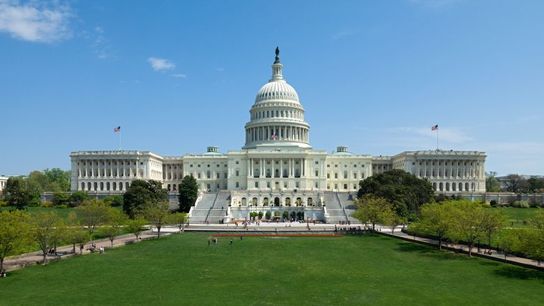And this is why no one -- no one on this side of the table, at least -- wanted politicians to get involved. This is why some of us have been banging the table so long and so loudly for the NCAA to get out in front of the pay-for-play train before it ran them over.
According to a report from Dennis Dodd of CBS Sports, a federal bill proposed last month would establish the Congressional Advisory Commission on Intercollegiate Athletics, which would, among other things, examine "the amount of funds expended on coaches' salaries."
"I'm mortified at these salaries," House Rep. Donna Shalala (D-FL) told CBS. "We have not been able to slow spending or expenditures."
Shalala sponsored the bill. She also served as the president of the University of Miami from 2001-15, a time that saw the Hurricanes rise to the top of the college football world, then be surpassed by programs that could outspend them.
The bill has six cosponsors in the House of Representatives: Ross Spanos (R-FL), Jim Cooper (D-TN), Sheila Jackson Lee (D-TX), Charlie Crist (D-FL), Thomas Suozzi (D-NY), and Alcee Hastings (D-FL). (Shalala says the bill has more cosponsors that have not been revealed.)
Now, this is where we trot out the obligatory sentence about the vast majority of bills die without so much as a whimper, and that Shalala's HR5528 still has to pass votes through the House and the Senate and avoid a Presidential veto to become law. That's a long, treacherous process. All of that is true.
But here's what's different: this isn't some lawmaker on a one-woman crusade. Shalala's bill has support from within the castle walls of College Sports, Inc.
Last year, UC Davis AD Dr. Kevin Blue asked Congress to limit coaching salaries in college sports.
"There's going to have to be some sort of systemic intervention because there is no natural way for (the schools) to control themselves," Blue wrote.
And here's a voice from the AD of one of college sports' biggest, most profitable brands: "College sports has never been more popular," said North Carolina athletic director Bubba Cunningham. "There has never been more money associated with college sports. It's not the creation of revenue that's necessarily bad. It's the use. We have strayed from what is most important."
Again, it's anyone's guess as to what becomes of this but, as Matt Brown pointed out yesterday, the Overton window as to the type of ideas for Congressional oversight into college coaches' bank accounts has absolutely shifted, to where Ohio University professor David Ridpath can tell CBS this and get a Congresswoman to listen:
"There has to be some constraints because it's just gotten out of control or, legally, we're going to have to start paying players. That doesn't mean Mike Krzyzewski might have to get by on $2 million rather than $9 million. You could actually put in a rule that a president should at least get paid $1 more [than a coach]."
Ridpath is the president of the Drake Group, a group that seeks increase the academic integrity in college sports. The Drake Group consulted Shalala on her bill, according to CBS.
Ridpath's above quote operates out of a false assumption, that colleges will have to start limiting what they pay coaches or they'll have to start paying players.
The entire idea of the Olympic model, of granting players their name, image and likeness rights like any other college student, is that they could earn whatever the market dictates and that money would come from third-parties, thus leaving athletics department and university finances largely untouched. Rather than slice the existing pie into smaller pieces, the thinking goes, why not just bake a second one?
But now the issue is fully out of College Sports Inc.'s control, and so it's anyone guess where this issue finally ends up. The politicians are poking around now, they're seeing a coach making $9 million a year calling "professionalized" college athletes entitled, and they're deciding that something seems off here.
